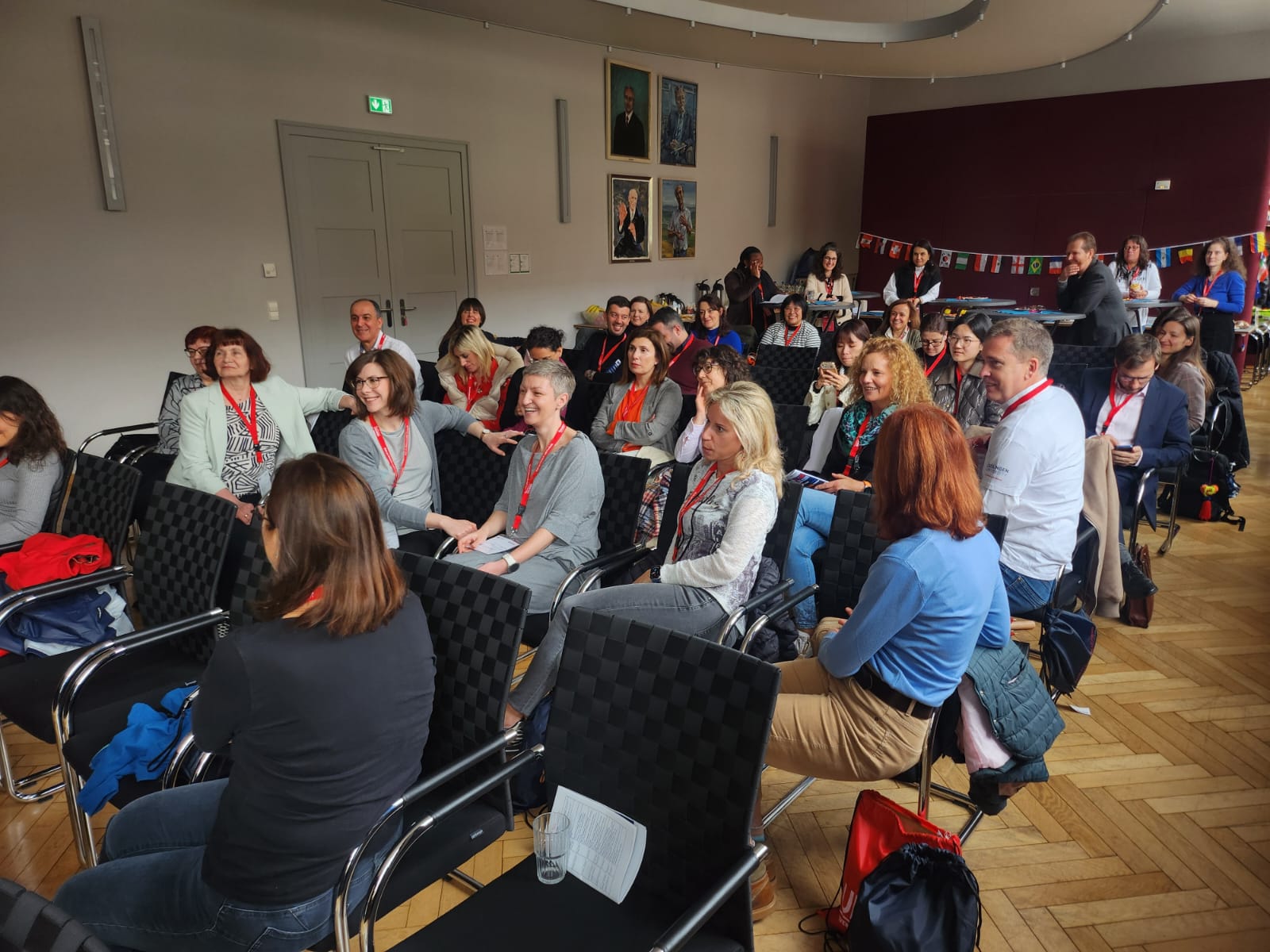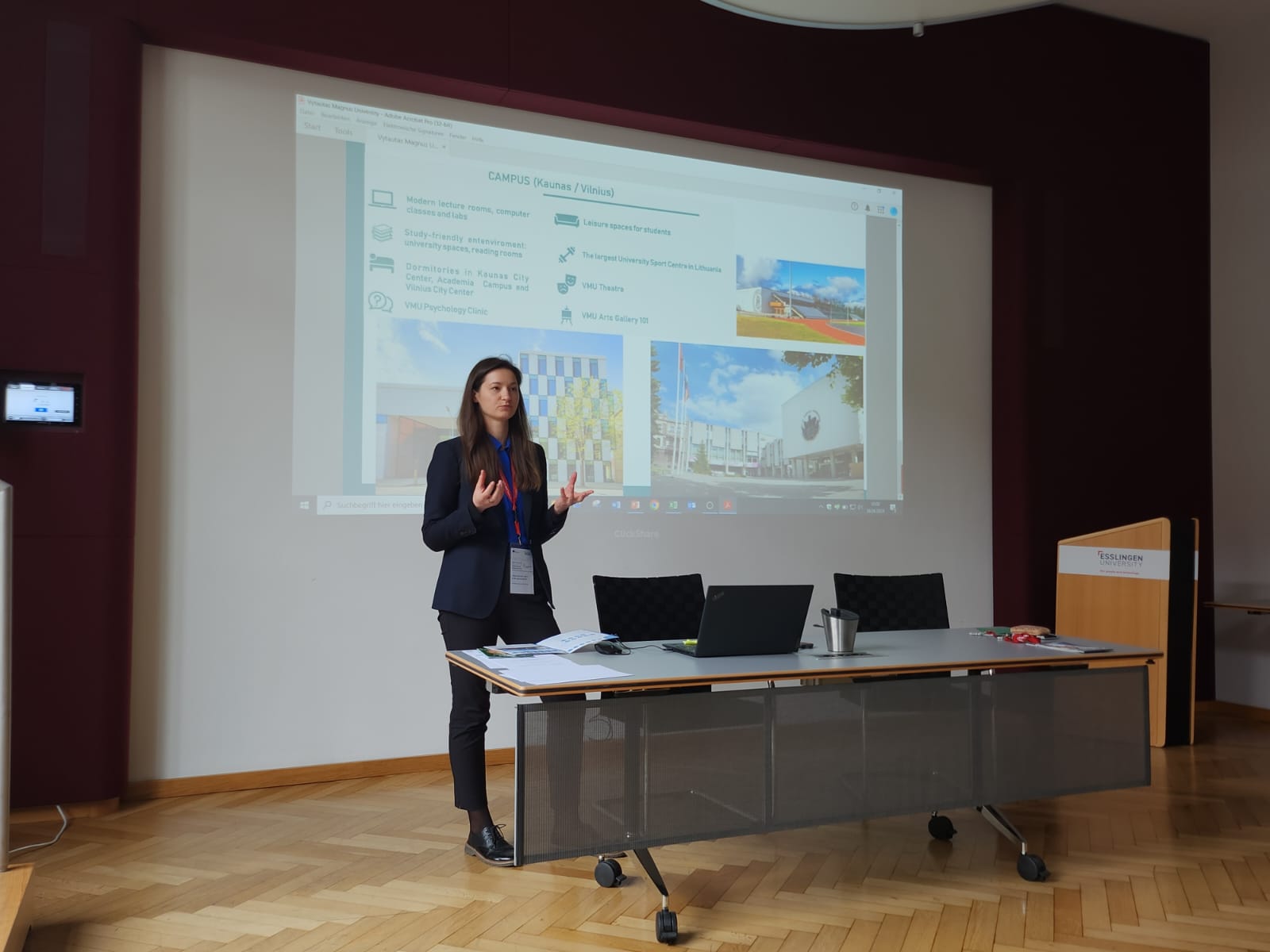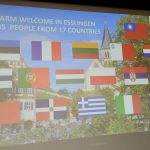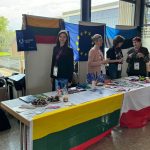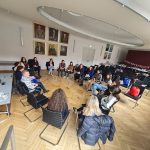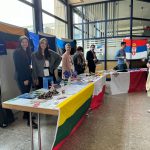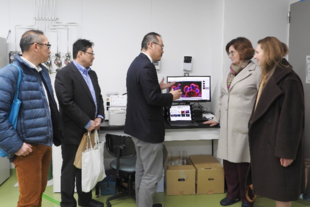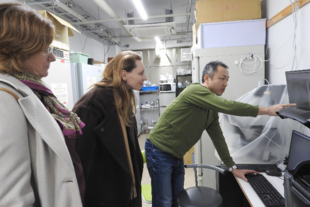VMU AA Autumn Intake 2024/2025 is open (extended application deadline). Apply now!
Would like to gain strong knowledge, solid skills, and invaluable international experience? Thinking about an unforgettable European student adventure and traveling the world?
Top-quality studies in a high-ranking university and living in Kaunas – located in the center of Europe – may be the perfect combination for You.
Your lifetime adventure can start now. With VMU Agriculture Academy.
Autumn Intake 2024/2025 study programmes:
- Accounting and Finance / Учет и Финансы (BA)
- Sustainable Bio-Business Management (BA)
- Logistics and Commerce (BA)
- Business Logistics (MA)
- Customs Process Management (MBA, online)
- Ecology and Climate Change (MA)
Application deadlines:
June 1: For applicants from non-EU/EFTA countries (excluding countries listed below)
July 1: For applicants from EU/EFTA countries and citizens of visa-free countries including Albania, Argentina, Australia, Brazil, Canada, Sakartvelo, Israel, Japan, Malaysia, Moldova, Mexico, New Zealand, Singapore, South Korea, United Kingdom, United States, Ukraine, Venezuela.
Information about Application and Admission Procedures
Information about Scholarships
Contact person: VMU Agriculture Academy International Coordinator Ekaterina Makrickiene ekaterina.makrickiene@vdu.lt +370 37 752 386
More information about VMU Agriculture Academy study programmes
Visit of VMU AA during the “International Erasmus+ Partner Days”
On 17-20 April, Dr. Monika Medikienė, International Coordinator at Vytautas Magnus University Agriculture Academy took part in the “International Erasmus+ Partner Days” at the University of Esslingen (Germany). The visit was implemented on the basis of Erasmus+ Learning Visits. There were 35 university staff members from various European countries, as well as China, Taiwan and the Dominican Republic participating in the event.
During the event, participants had the opportunity to take part in seminars and listen to keynote presentations. Dr. Monika Medikienė was one of the five keynote speakers at the International Partner Days. The International Coordinator presented good practices of Erasmus+ blended intensive programmes implemented in Vytautas Magnus University Agriculture Academy. Between April 2023 and March 2024 there have been 6 Erasmus+ BIPs implemented at the VMU Agriculture Academy; 121 international students from Estonia, Latvia and Poland participated. Dr. Monika Medikienė talked about the selection of partners of BIPs, procedure for the students to be selected, the organization of the programme, including the ice-breaking activities, lectures by local and international teachers, study tours, virtual learning environment, etc.
On 18 April, an “International Night” took place on the campus of the University of Esslingen, where Erasmus+ exchange students presented the cuisine of their home countries and invited students to come for a study exchange at their universities. The VMU Academy of Agriculture was also presented during the “International Night”.
CONFERENCE “YOUNG SCIENTIST 2024”
The 21st annual conference of young scientists “YOUNG SCIENTIST 2024” organized by the Vytautas Magnus University Agriculture Academy (VMU AA) will be held on April 11 2024 remotely. The conference is intended for the first, second and third degree students. The purpose of the conference is to involve students in scientific activities, develop the ability to publicize scientific research results, present their scientific research achievements and discuss topical issues of bioeconomy, green course, climate change, ecosystem sustainability, rational use and protection of natural resources.
There is no conference fee for students. Certificates of conference participants will be awarded to the speakers of the conference.
Speakers will be able to publish articles in the collection of articles of the conference “YOUNG SCIENTIST 2024” or in another scientific publication, for example, in the scientific journal „Agricultural engineering“ or another, after submitting articles that meet the requirements for articles in a scientific publication.
| Conference topics | Subtopics |
| Bioeconomy | Accounting and finance: challenges and opportunities |
| Bioeconomy, sustainability of agriculture and food sector | |
| Innovations and solutions in business logistics | |
| Management of agri-business and other bioeconomy business organizations | |
| Sustainable development of rural areas | |
| Biosystems engineering | Energy engineering |
| Land management | |
| Mechanical engineering | |
| Technology engineering | |
| Transport engineering | |
| Water engineering | |
| Sustainability of agricultural, forest, and water ecosystems | Agronomy |
| Food quality and safety | |
| Sustainability of agricultural ecosystems | |
| Ecosystem services | |
| Sustainable forestry | |
| Wildlife population management |
Pre-registration for the conference until February 15, 2024.
Articles for the conference “YOUNG SCIENTIST 2024” are accepted until March 8, 2024. (the link to upload the article). The articles must be prepared according to the recommendations for the authors of the articles (Annex 1_Article template, Annex 2_Authors guarantee letter).
Delegates from VMU Agriculture Academy Pays a Courtesy Call on Gifu University
On Tuesday, March 5, 2024, two delegates from Vytautas Magnus University (VMU) Agriculture Academy, Republic of Lithuania, paid a courtesy call on Gifu University. They were Prof. Dr. Astrida Miceikiene, Chancellor of VMU Agriculture Academy, and Ms. Virginija Kargyte, Deputy Director for International Affairs of Bioeconomy Research Institute at VMU Agriculture Academy.
Since the conclusion of university-level exchange agreement between Gifu University and VMU in January 2012, the two universities have actively engaged in student and faculty exchanges for more than ten years. In 2022, seven members of Gifu University, led by Vice President KAMBARA Shinji (International Affairs, Information and (Deputy in Charge for) Evaluation), visited VMU and exchanged opinions regarding the possibilities of starting collaborative educational programs at the doctoral level.
In Gifu University, the two delegates held talks with Vice President Kambara, Professor HIRAMATSU Ken, Dean of the United Graduate School of Agricultural Science (UGSAS), Professor MOURI Tetsuya from the Faculty of Engineering, and Professor YAYOTA Masato from the Faculty of Applied Biological Sciences. First, the two delegates spoke about the sphere of research at the Agriculture Academy, along with its partnership with business communities. Later, they shared their thoughts with the GU staff regarding the prospects and challenges in launching collaborative educational programs between the Agriculture Academy and UGSAS.
Professor YABE Tomio from the Faculty of Applied Biological Sciences also joined the subsequent luncheon meeting with the delegates at a newly built ‘Tokai Open Innovation Complex’ building on campus and a laboratory inspection tour around the Faculty of Applied Biological Sciences building.
It is expected that the latest visit by the two delegates from VMU Agriculture Academy will lead to a successful launch of new educational programs and continued active interchange among students and faculty members between Gifu University and VMU in the future.
VISIT OF TEACHERS OF VMU AGRICULTURE ACADEMY TO LATVIA UNIVERSITY OF LIFE SCIENCES AND TECHNOLOGIES
Vytautas Magnus University (VMU) and the Latvia University of Life Sciences and Technologies are long-standing partners of the Erasmus+ program. The teachers of VMU Agriculture Academy assoc. prof. dr. Midona Dapkienė (Department of Water Engineering, Faculty of Engineering) and prof. dr. Laima Česonienė (Department of Environment and Ecology, Faculty of Forest Sciences and Ecology) visited the Faculty of Environment and Civil Engineering under the Erasmus+ mobility program on March 19th to the 21st 2024.
The Faculty of Environment and Civil Engineering is the second biggest faculty of the University, where new engineers-construction, environment and water management specialists, land surveyors, as well as landscape designers and planners, are prepared. The teachers got acquainted with the material base of studies and scientific research and the innovative equipment. At the faculty there are four scientific laboratories and two of them are located in advanced two storey premises, which allows the use of all the functional possibilities.
The VMU representatives got acquainted with the organization of studies, teaching methodologies, currently ongoing research and scientific projects. The experience gained will be useful in improving the quality of studies at the VMU Academy of Agriculture and continuing cooperation in the field of science.
The teachers sincerely thank the professor of the Department of Environmental Engineering and Water Management dr. Ainis Lagzdins for his full assistance during the visit to Latvia University of Life Sciences and Technologies.
14th international scientific conference “Accounting and Finance for Business 2024: Towards Sustainability”
Traditionally, an accounting and finance conference is organised every two years at the Faculty of Bioeconomy Development of the Vytautas Magnus University Agriculture Academy (VMU AA). The 14th international scientific conference “Accounting and Finance for Business 2024: Towards Sustainability” will be organised in the year of the 100th anniversary of the VMU Agriculture Academy.
The role of the VMU Agriculture Academy in promoting sustainability is irreplaceable and fundamental. The relationship between the VMU Agriculture Academy and sustainability is very important and relevant because the agricultural sector has been directly related to many aspects of sustainability, therefore since 1924. Since the establishment of the Agriculture Academy, accounting and financial studies have been carried out, as well as research contributing to the sustainable development of the agricultural sector. These efforts have become important steps towards the sustainability of the agricultural sector, and as we continue to develop the topic of sustainability, we continue the scientific and practical discussions about the importance of accounting and finance in all organisations.
Today, as society becomes more concerned with issues such as climate change, social responsibility, and sustainability, accounting and finance are becoming increasingly important. But what exactly does sustainability mean in these areas? And why is it becoming such a critical issue? We invite you to join us on 14-15 November 2024 at the 14th international scientific conference “Accounting and Finance for Business 2024: Towards Sustainability”, so that we can search for answers together. The Accounting and Finance Conference will be organised remotely. The conference will be held in English.
Sustainability is one of the biggest challenges facing companies and organisations today. It means responsibility not only to shareholders, but also to society and the environment. As climate change, social responsibility, and other environmental issues become more relevant to accounting and finance, accounting and finance must become part of this sustainability movement.
Sustainability accounting and finance enables organisations to measure the social and environmental benefits they deliver. This includes not only economic aspects, but also social and environmental impacts. This is an integral part of sustainability. We believe that accounting and finance can and must contribute to business coherence and sustainable development. It is not only science but also practice that has an increasingly important role to play.
On the second day of the conference, the panel presentations and discussion session “Linking sustainability policy to future finance and accounting” will be held, where we hope to find many important answers.
Early registration is now open for participants until 3 June 2024. A reduced participation fee will apply to those who wish to make an oral message or submit a pre-recorded presentation message by 3 June 2024. Registration for presenters will open until 7 October 2024, and for listeners until 7 November 2024. There is no fee for listeners.
More information about the 14th international scientific conference “Accounting and Finance for Business 2024: Towards Sustainability” and key deadlines available on the conference website https://afk.vdu.lt/
Join us at the 2024 Conference and contribute to important discussions that can change the world of business!
The Organising Committee of the International Scientific Conference “Accounting and Finance for Business 2024: Towards Sustainability”
MBA in Customs Process Management – to move up the career ladder with confidence
The ability to manage customs processes with confidence and professionalism is particularly important for those seeking to work in international companies with trade-related business operations. The sector is characterised by career opportunities and motivating salaries. Moreover, there is a shortage of highly skilled professionals and managers in the labour market. The MBA study programme “Customs Process Management” at the VMU Agriculture Academy, which was launched in autumn and has attracted a group eager to develop their skills and promising students, is popular due to its exceptional opportunity to acquire knowledge of professionals working in international markets and its convenient study format for working professionals. The intensive 1-year study programme is organised in English by distance learning, with lecturers who are highly regarded in Lithuania and abroad, sharing their experience and insights. Students admit that the language and intensity of the course are challenging at first, but once they have made it through the first semester, they see it as a great opportunity to advance.
Study programme for future customs business leaders
The Chair of the Programme Committee Associate Professor Erika Besusparienė points out that the MBA study programme “Customs Process Management” is designed for those who want to pursue a career in the customs business or who want to become managers in the customs business, and it is currently the first MBA study programme in the customs field in Lithuania. Graduates will be awarded a Master of Business Administration international qualification.
“In the European context, master’s degrees in customs face two challenges: in some countries, they are taught in the national language of the country, while in others, customs are only covered as a specialisation. In discussions with business representatives, taking into account developments in the EU and building on the EU Customs Knowledge Framework, we aim to ensure that the study programme we have developed both takes a comprehensive view of the customs field and combines the other necessary competences”, says Assoc. Prof. Dr. E. Besusparienė.
The Chair of the Programme Committee reveals that the main pillars of the programme’s design were customs education within the framework of the EU’s Customs Competence Framework and the EU Customs 2040 vision, which is why the study programme combines customs and taxation.
The application for the EU Customs Recognition Certificate for the study programme “Customs Process Management” was submitted in 2024. This certificate certifies that the study programme meets the requirements of the EU Customs competences at EU level. “Of course, these areas alone are not enough for a future manager, so we have also included international trade through supply chains, sustainable customs management, communication, and, in order to take account of new risks, we have also added social responsibility and ethics and environmental protection”, says Assoc. Prof. Dr. E. Besusparienė. She notes that students appreciate the programme as being in line with today’s relevant issues, with lecturers openly sharing not only the latest theoretical knowledge, but also insights from practical work, which is particularly useful for students.
Relevant knowledge and advice from Lithuanian and foreign lecturers
Jonas Aleksonis, Deputy Director of UAB Durga, says that he is constantly improving his skills and attending various courses and seminars to deepen his knowledge in the fields of sales, customer engagement, and the art of negotiation, and has wanted to obtain a master’s degree for a long time. “I graduated from VMU in 2005 with a degree in Information Technology. A master’s degree has always been an aspiration. I wanted to study something other than IT, but my existing IT education did not meet the entry requirements for social and economic studies. I did not want to do a master’s degree in IT because I was deepening my knowledge in the field of customs activities. The admission conditions for the MBA programme “Customs Process Management” were flexible, the relevance of the programme, the convenient study format, and the opportunity to learn from the practice of lecturers working in the customs field drew my attention”, says J. Aleksonis.
He notes that halfway through his studies, he wants to gain more knowledge in the field and improve his skills. “I think the knowledge I have gained will help me in my work to make better decisions and to look for other opportunities in my current activities. Political developments are fundamentally changing the direction of exports and imports, which requires new knowledge and more up-to-date information, which can be shared by practitioners who work in international markets and who have overcome similar challenges themselves”, J. Aleksonis shares insights.
Aleksonis admits that having an international teaching team and studying in English was a bit stressful at first. “As students, we were anxious about studying in English because we needed to quickly refresh our forgotten knowledge of the language. The lecturers kindly came to our rescue in the beginning by patiently repeating the material and presenting it in writing a few times. I think all of us and our colleagues overcame the challenge quickly and successfully and are now fluent in English”, says a student about the challenges of studying in a foreign language.
Recalling the expectations he had before his studies, J. Aleksonis estimates that he has exceeded them by 100%. “The lecturers are highly qualified and experienced practitioners who share not only theoretical knowledge but also real experience. The study programme is relevant and practical, meeting the needs of today’s customs field. In my opinion, these studies are an excellent choice not only for customs brokers, but also for carriers, freight forwarders, logistics specialists in international trade companies, as well as for customs officers looking for further career opportunities. The programme is designed with the needs of practitioners in mind, so that the knowledge gained can be immediately applied at work. It is also important that the format of distance learning in the evenings is appropriate, as it allows students to balance their studies with their work”, he shares insights.
It helps to deepen professional knowledge and opens up new opportunities
Gitana Dumbraitė, a customs broker at UAB Aurinka, says that the choice of this programme was motivated by the desire to improve her English and to get up-to-date information about customs processes.
“I work alone, which makes it more difficult to keep up to date and to get the latest information. This programme has helped me to broaden my knowledge, and the fact that it’s in English is a big part of that. At first it was difficult to understand the English-speaking lecturers, it took a lot of effort, but now I see that it is much easier to analyse documents, laws and regulations in English, which not only makes my work easier, but also opens up new professional opportunities”, shares G. Dumbraitė.
Halfway through her year-long studies, she notes that she has gained additional information about EU customs and Lithuanian customs processes, which makes her feel even stronger and more confident in her professional field.
Lecture recordings to consolidate knowledge
Karolis Zelenkauskas, a student of the programme, says that he had planned to study for a Master’s degree before finishing his Bachelor’s degree, but the thought of studying on an extended basis for another 3 years was discouraging. “At the end of my bachelor’s studies, the Dean of the Faculty of Bioeconomy Development, Prof. Dr. Bernardas Vaznonis, introduced the Master’s degree programmes, including a year-long MBA programme on “Customs Process Management”. I liked the higher intensity and shorter duration of the studies, as well as the fact that the lectures are held remotely in the evenings – it is possible to balance the lectures with work”, says K. Zelenkauskas, who graduated from his bachelor’s degree at the VMU Agriculture Academy last year.
The only hesitation K. Zelenkauskas had when he was interested in the new study programme was the organisation of studies in English. “I thought that studying in a foreign language would make it more difficult to understand the material and complete assignments. The hesitation lasted the whole summer until the discussion with the Dean. When I expressed my concerns about the English language, Prof. Dr. B. Vaznonis reassured me that all lectures would be recorded and if I didn’t understand something, I would be able to review them again. It was during this interview that I decided to enrol in the MBA programme “Customs Process Management”. Interestingly, once I started my studies, I had no problems with the English language” says K. Zelenkauskas, revealing that the lecturers also help to overcome all other challenges. According to the student, the only thing you need to do is to be confident to ask questions, and lecturers kindly explain all the problems and share their experience.
The student says he sees that the programme is tailored to those who are already working in customs and want to develop their skills, as well as those who would like to become customs specialists. “I feel that I have improved in a specific field of study, I have gained a lot of theoretical knowledge and useful insights from professionals in the sector. I also have much more confidence in my English language skills. It is important that the lecturers are flexible, focus on specific topics that are relevant to the students, and share their knowledge on specific subjects in the customs field. Flexibility is also felt in the reporting, you can choose individual presentations or team presentations, etc. The lecturers are friendly and understanding, they know that English is not our mother tongue, so they always try to communicate clearly and if we don’t understand something, they use other words to explain. This programme will help you improve your English, and if you don’t know English but want to learn it, this is a good opportunity to get it started”, says K. Zelenkauskas.
A year of study with the opportunity to take part in Erasmus+ BIP courses
Leyli Gurbanzade, who has been living in Lithuania for six years and holds a bachelor’s degree from VMU, says that the first six months of her year-long MBA studies were really intense. It was challenging at times trying to balance work commitments with the assignments, but in terms of the amount of knowledge gained, the programme is useful, relevant and fully meets expectations.
Gurbanzade highlights the opportunity for students to take part in the Erasmus+ Blended Intensive Programmes (BIP) course, where she, together with G. Dumbraite, gained new knowledge in the Czech Republic. “The course was very interesting, and I learned a lot of new things. I also made contacts with other students and lecturers. Now I can feel more confident in doing projects and in teamwork. I have also gained skills in problem solving, critical thinking and leadership. In addition, I now have a certificate and experience of working in a multi-cultural team”, says L. Gurbanzadeh about the benefits of the Erasmus+ BIP.
Dumbraitė notes that her week in the Czech Republic brought good practice in communicating with international students. “We studied together with students from Bangladesh, India, Pakistan, Ukraine, Poland, Azerbaijan, Hungary. It was interesting to learn about their experiences. During this project we have been learning how to prepare projects for European Union funding and this knowledge will open up more new opportunities”, says G.Dumbraitė.
Project-based essay instead of a final master’s thesis
Assoc. Prof. Dr. E. Besusparienė says that one of the unique features of the study programme is that instead of the traditional master’s thesis, a final project is prepared, which is smaller in size. The final project is focused on solving a practical problem and applying innovations in business or in the country. “The final project provides an opportunity for the student to express his or her innovation and creativity, and the project thesis can be directly linked to business needs, which helps the graduating student to establish or strengthen the link with the real context of the labour market. We are constantly looking for solutions to help students achieve their professional goals through this intensive programme, and we would like to see this study programme open up new opportunities”, says Assoc. Prof. Dr. E. Besusparienė.
The Chair of the Programme Committee points out that the MBA in Customs Process Management is designed for those who wish to change careers or move up the career ladder. “We work closely with the Lithuanian Customs Practitioners Association, we are members of INCU, and we have also become members of the Institute of Customs Knowledge. Our students also have the opportunity to participate in these international networks, to deepen their knowledge, to build their international network, which undoubtedly gives them new career prospects. So, if a person has been working since graduating from a bachelor’s degree and has 3 years of work experience after graduation (whether as a manager, accountant, logistician or any other type of worker), he/she can enrol in the MBA programme “Customs Process Management”. The most important thing is the intrinsic motivation to climb the career ladder, which is why we have made motivation an important part of the admission rules”, summarises VMU Agriculture Academy Assoc. Prof. Dr. E. Besusparienė.
Future International Trade and Customs Process Management
We invite you to online webinar, we will explore the complex intersection of future international trade and customs process management. As globalisation continues to reshape the trade landscape, it’s imperative to understand the evolving dynamics between nations and the key role customs processes play in facilitating or hindering trade flows. We explore how advances in regulatory frameworks, geopolitical shifts, and technology are shaping the future of international trade and how customs process management must adapt to these changes. This webinar will provide an exclusive insight into the benefits of an MBA in Customs Process Management. Listeners will gain valuable insights into how advanced study can enhance their career prospects and prepare them for the challenges of navigating international trade regulations.
Applications for foreign students to study the MBA Customs Process are now open via vytautasmagnus.dreamapply.com
Webinar Topics:
- Adapting to Global Trade Trends: Navigating Customs Processes in a Changing World
Enrika Naujokė, Member of programme committee, Head of Lithuanian Customs Practitioner Asssociation and Head of CustomsClear platform
- Customs Reform 2040: Shaping the Future of Cross-Border Trade
Dr. Ilona Mishchenko, Member of programme committee and lecturer of programme
- MBA Studies: Innovating Customs Process Management for Future Trade
Dr. Erika Besusparienė, Head of programme commitee and lecturer of programme
Time:
14 March 2024 4 p.m. (EET)
The planned duration of the webinar will be approximately one hour.
Registration:
https://forms.office.com/e/ZDraQsvKvw
The link to join the TEAMS platform before the webinar will be sent to the email address provided during registration.
VMU AA Autumn Intake 2024/2025 is open. Apply now!
Would like to gain strong knowledge, solid skills, and invaluable international experience? Thinking about an unforgettable European student adventure and traveling the world?
Top-quality studies in a high-ranking university and living in Kaunas – located in the center of Europe – may be the perfect combination for You.
Your lifetime adventure can start now. With VMU Agriculture Academy.
Autumn Intake 2024/2025 study programmes:
- Accounting and Finance / Учет и Финансы (BA)
- Sustainable Bio-Business Management (BA)
- Logistics and Commerce (BA)
- Sustainable Engineering (BA)
- Agronomy (MA)
- Business Logistics (MA)
- Customs Process Management (MBA, online)
- Hydraulic Engineering (MA)
- Ecology and Climate Change (MA)
Application deadlines:
Information about Application and Admission Procedures
Information about Scholarships
Contact person: VMU Agriculture Academy International Coordinator Ekaterina Makrickiene ekaterina.makrickiene@vdu.lt +370 37 752 386
More information about VMU Agriculture Academy study programmes
VMU Agriculture Academy events 2024
Vytautas Magnus University Agriculture Academy (VMU AA) invites to participate at scientific events at 2024.
- About
- About Agri-Food BM programme
- Academic infrastructure units
- All events
- All news
- Aquaculture center
- Archives
- Biosystems Engineering
- Center of Animal husbandry selections, breeding values and dissemination
- Centre of Biosystems Engineering, Biomass Energetics and Water Engineering
- Circular Biobased Economy
- Climate change
- Contacts
- Contacts
- Events
- Events archive
- Faculties
- For business and society
- Innovative products
- International Cooperation
- International projects
- Joint Research Centre of Agriculture and Forestry
- Journal “Human and Nature Safety”
- Laboratory of Technology Safety
- Laboratory services
- Living Environment
- More labs
- News
- Project
- QUALS project description
- Research
- Research areas
- Scientific events
- Scope
- Sitemap
- Studies
- Study programmes
- Technology Transfer & Commercialization
- THE ROLE OF ORGANISATION IN THE PROJECT
- THE ROLE OF ORGANISATION IN THE PROJECT
- THE ROLE OF ORGANISATION IN THE PROJECT
- The Study Process
- Žemės ūkio žinių ir inovacijų sistemos klasteris





